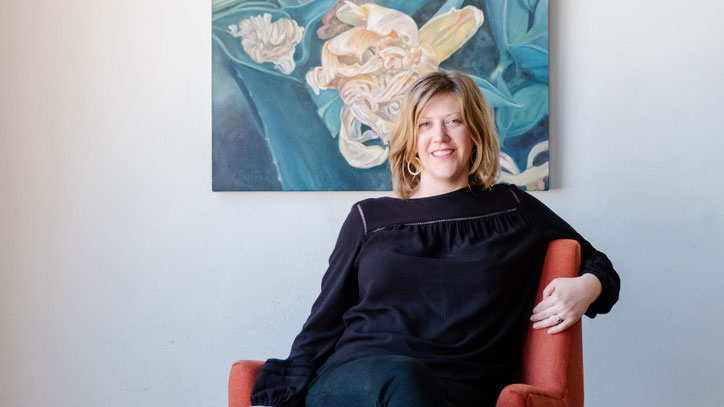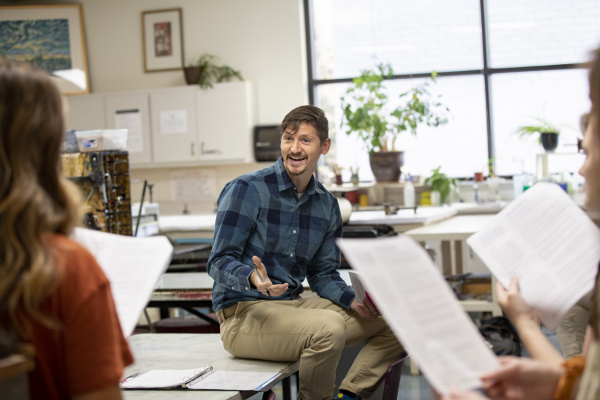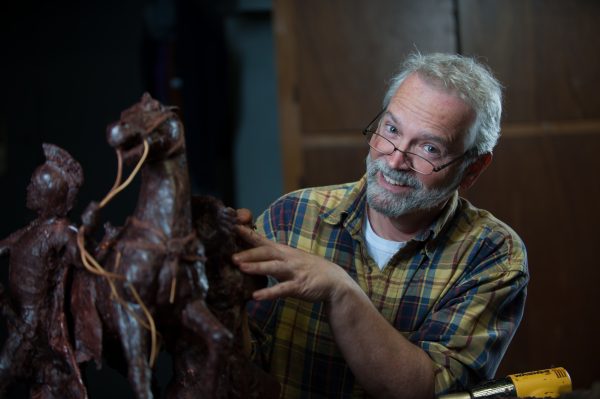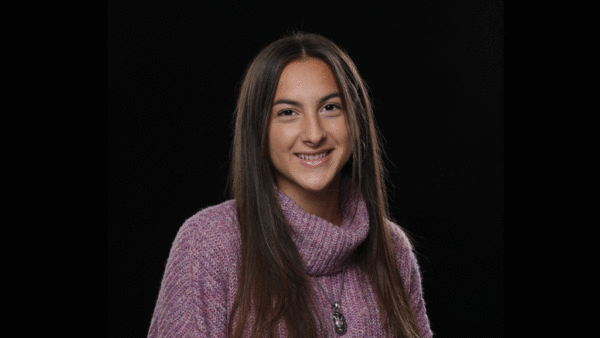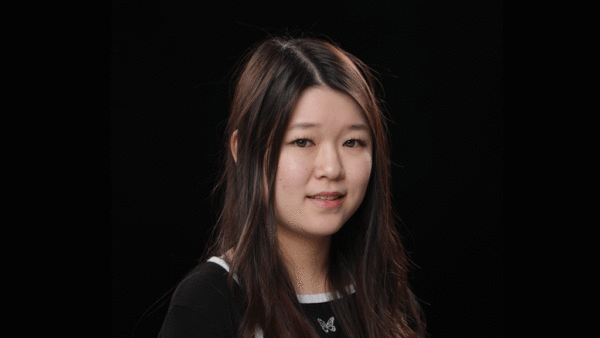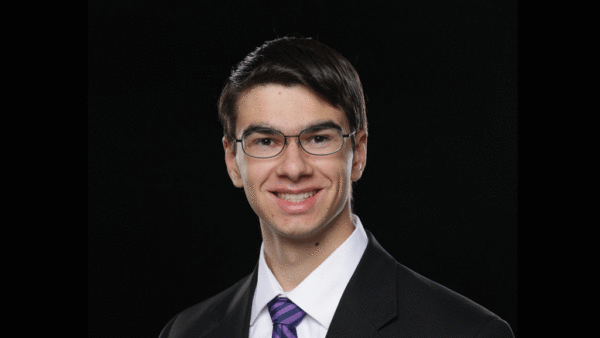Leaf Institute of Art and Vocation is the product of a recent endeavor to impact artists around Greenville and their communities. Early in 2018, Brannon McAllister and Michelle Radford—who both received undergraduate studio art degrees from BJU in 2003—began to look for a way to help Greenville artists grow in their work. “(We wanted) to teach serious art classes to people in the community who wanted to study art in a serious way but weren’t looking for a degree,” Radford said.
But they wanted to do more than provide art education. “We were really interested in beginning discussions around Greenville about how faith and art integrate (because) Greenville is very artsy, … very churchy and … very worky, as the pastor of Downtown Presbyterian Church says,” Radford explained.
The two artists collaborated with their separate expertises—McAllister as a graphic designer and entrepreneur, and Radford as a BJU Art + Design faculty member. Their skill sets laid the foundation for a nonprofit organization dedicated to the arts.
They knew an institute would give people a location and communicate an identity. Radford said, “When you’re clear on what your organization is about, people can attach different ideas to it (and) look to see what’s coming up. And it’s a little bit easier than trying to market every single event over and over again.”
McAllister noticed a recently vacated building in the West End of Greenville and soon acquired it. Finding a place to establish an institute “catapulted us into existence,” Radford said. “We had a space before we had any programming, but we know that we (would think of) plenty of ideas.”
With the groundwork in place, McAllister, Radford and Ian Crook (International Business, ‘07)—the director of finance—opened Leaf Institute of Art and Vocation in July 2018.
About the Name
Radford explained the significance of the Institute’s name:
There is a short story by Tolkien called “Leaf by Niggle.” Niggle is a painter—he’s not necessarily a very good painter—but he loves his painting. And (while completing) a painting of a tree, (he finds) that a lot of people in his nearby community interrupt him. He really begrudges the interruptions. … But what he finds … is that (his) community that … seemed to be interrupting him a lot was really important to his thriving (as an artist). He also finds out that (his work) as an artist was lasting, even though … he and his community doubted it.
So that has been a real encouragement to all of us at Leaf Institute, that our work matters … even though we’re going to feel an inherent tension all the time between our different callings and responsibilities. … It’s easy to think that our actual day to day work won’t last. And that’s one of the things we try to talk about at Leaf Institute—that it does last and it is something that God really cares about.
What Leaf Institute Offers
McAllister and Radford based the programs on their creativity. “We basically just started making up events that were interesting to us,” Radford said. These events cover the fine arts spectrum, from painting to music to writing. Artists attend classes and workshops, often featuring guest artists and pastors. But there are also programs that are specifically designed to examine the philosophy behind art. Here are a few examples:
Leaf Fellowship
First offered in 2019, this nine-month program is a partnership with the Center for Faith and Work in which the Institute imitates the Gotham Fellowship in New York City. Radford said, “The Fellows are learning how to deeply integrate theology (with) a worldview and how they view culture (regarding) what they do during the week.” Outside of the course reading—2,500 pages of material throughout the program—and lots of listening, the Fellows have a weekly 7–9 a.m. meeting to discuss the reading, a monthly Saturday gathering, and a few retreats.
Flourishment
Leaf Institute partners with ALIGN for Business to offer a monthly luncheon that teaches leaders how to help their employees flourish. “It’s honestly a very different viewpoint than many of us take to work. We often try to apply God’s principles of how His kingdom works to us and our work, but not a lot of times to business,” said Radford.
Vocationality
“This program walks a person through thinking about their giftings, interests and opportunities,” Radford said. “(It shows) how God has prepared you to work—honestly, what’s a good fit for you.” Guides listen to individuals’ stories and advise artists on their callings. “God has a really specific plan for each of us, and a lot of time we don’t access all the information that we have (that would help us carry out that plan),” Radford explained.
Cultural Events
Leaf Institute hosts art exhibitions and performances to promote artists’ work. Events usually feature professional artists with some exceptions, such as a BJU theatre graduate student who presented a play he had written. “I have a goal to feature more emerging talent like that,” Radford said.
Future Plans
Plans for a residency program and Art and Faith Conversations are also underway.
Who Leaf Institute Is For
Artists achieve a wide range of goals at the Institute. “Maybe (people want) to (join) to further their professional development. Or maybe they would be serious high school students. Or maybe they would be looking at a second career,” Radford said.
Many of the programs at Leaf Institute are designed for people already in the workforce. For example, Radford said, “Leaf Fellowship is for a 25 and older kind of crowd, … (people who have) had time to feel the weight of the work world.”
While a program isn’t a good fit for students busy with classwork, a one-time class or workshop could be useful for growing in a specific area. “(Leaf Institute) is very flexible with different levels of commitment and different levels of price,” Radford said.
Overall, the Institute can be a great help to Christian artists. Said Radford: “It can be easy to think, ‘Oh I pretty much know about faith and work because I’m a Christian. I work really hard or whatever.’ But I would just say … this is a topic that’s worth studying.”
Artists can find information on Instagram and Facebook, but the best way to receive updates is by email.
The Ultimate Mission of Art
At its new location at the former Dunean United Methodist Church, Leaf Institute continues to provide Greenville with a unique perspective on art. “What we don’t often have in Greenville is an integration of (faith, work and art deeper) than a surface level,” Radford said. “(We emphasize) theology—the root of why we create—and how we would (run) our businesses as artists, or as anything else.”
Ultimately, God intended art to give Him glory, and Radford wants people to understand that truth. “I think we can work on a deeper level (when we consider) how we can lean into God’s telos for the arts,” she said. “That way I’m not only imaging Him by being a creator, but I’m also pointing my creativity in a direction that significantly impacts our culture.”
See Also: Jared Stanley: Imprinting the Classroom and the Community


